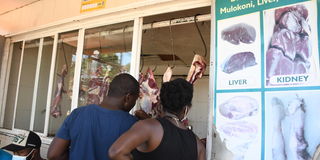Plan for both better and bad days

It is not a luxury for you to plan how you will go about the year. PHOTO | Edgar R. Batte
What you need to know:
If 2020 has taught Ugandans anything, it is saving. For those who had saved, perhaps they have sailed through and have time to plan better.
At the start of the year, most people make personal plans. However, a few months down the road, everything is thrown on the wire and left to dry.
Therefore, the question is how far can you push to sustain your plans even when they seem to have overwhelmed you.
Covid-19 has been and remains an excuse. Indeed it has disrupted many things but you must find a way without hanging onto excuses. How you do it is what we shall seek to talk about today.
Set rules
Actually, Andrew Kyambadde, a tax lawyer, believes it is you must always set rules by which you stick to make a difference.
“The way you get income is the same way expenses have to occur. If you have a budget, stick to it. You must plan through your budget and be realistic with yourself,” he says.
For instance, he says, if you earn Shs1m, when it comes to expenditure, keep it within the confine or even less.
“You have to save. 15 per cent of what you earn, as a principle, must be saved. Here, I am talking about the real saving, not this saving of dropping coins in a piggybank,” he says.
Saving is just an avenue through which you can accumulate cash for investment.
Many people save to consume but saving becomes meaningful only if you use the savings to invest into an asset or business growth.
Therefore, Kyambadde says, saving is only sensible if it targets to make an investment.
“Personally, I plan my money in such a way that I look at investment first and savings to create a buffer,” he says.
Understand your inner self
John Allan Namu, an investigative journalist from Africa Uncensored, never lets money use him.
In fact, he says, that is a lesson he has learnt through experience and is convinced it has guided him through the toughest times.
“Sometimes we are so afraid of the possibility that we could lose money yet the goal of money is to do something for you,” he says.
Therefore, he notes, personal planning demands that you understand yourself, especially in regard to what triggers you and spending habits.
For the basis of planning, which, if not respected will push you on the edge, must be based on how you understand yourself.
“This year has been a lesson. In fact it has taught us self-control and adjusting to existing circumstances. You can plan but what happens if there is a crisis? Namu wonders.
Therefore, he notes, personal planning demands that we plan for both the bad and good times. In the good times, savings grow you, while during the bad times, savings lift you out of a ditch.
2020 lessons
According to Namu, if 2020 has taught us anything, it is planning and saving for the unknown.
“I think it has been a lesson to everybody. If you have not learnt anything, then you have not been paying attention,” he says.
But beyond the lessons, Julius Rwotlonyo, the Watoto Church associate team leader says, God is the overall planner.
“We plan but God has already laid out our plans. Therefore, we must pray to have a better perspective of what is in store,” he says.




